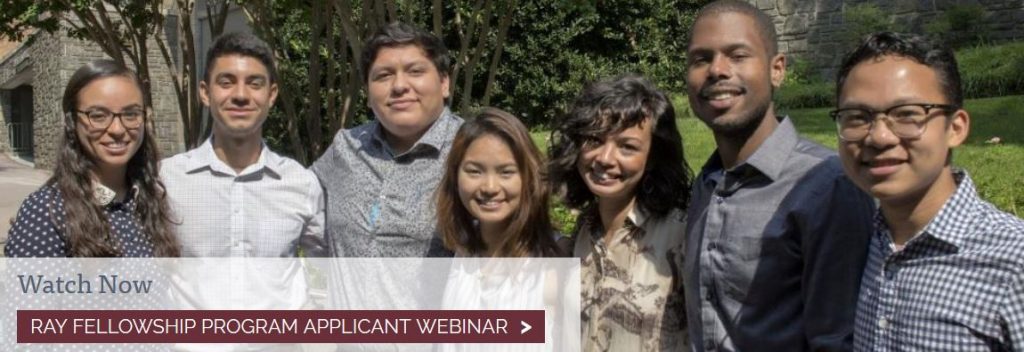The lack of racial diversity within the marine conservation community is a persistent problem that is becoming increasingly recognized. Recognizing that diversity is a value important to the conservation community and that we have not always made the progress we strive to make, we seek to work together to help rectify this shortcoming by striving for greater diversity, equity, and inclusion in the marine conservation community, in particular, racial diversity. Not only is it intrinsically incumbent upon our sector to change practices that contribute to the lack of people of color in the field of marine science and policy, addressing this problem will also make our work more relevant, accessible, and successful. To this end, the Roger Arliner Young (RAY) Marine Conservation Diversity Fellowship focuses on increasing opportunities for people of color to learn about, engage with, and enter the marine environmental NGO sector. The fellowships will be designed to support and attract recent college graduates of color with exceptional promise and demonstrated accomplishment who seek to be leaders in the nonprofit and philanthropic sectors. To learn more about Dr. Roger Arliner Young and this fellowship see the webpage.
Program Overview
Inspired by efforts to increase racial diversity in the marine conservation field, The Roger Arliner Young (RAY) Marine Conservation Diversity Fellowship Program is a response to the call for mainstream environmental organizations to work to increase and provide supported career pathways for people of color within the field. The RAY Fellowship Program is a paid fellowship designed to equip recent college graduates with an undergraduate degree with the tools and support they need to become leaders in the ocean conservation field; one that fully represents the rich and diverse communities within the United States.
RAY Fellows will be placed within one of our member organizations for a year-long paid fellowship position, with the resources and support to develop experiences that will launch them onto a path of career growth in the conservation field. Fellows will work with mentors, grow their networks, and forge lasting relationships with their cohort of fellows. RAY Fellowship positions are full time paid positions with competitive entry-level salaries plus benefits. Fellows will also receive a stipend of $1,000 to go towards professional development opportunities, in addition to coordinated professional development through RAY Member Organizations.
Applications for the 2018-2019 Fellowship cycle will open in January 2018, and Fellowship positions will begin July 16, 2018.
Ideal Candidates
The RAY Marine Conservation Diversity Fellowship looks for applicants that demonstrate:
- Passion and capacity to exercise leadership and respond to social and environmental challenges
- Willingness to actively contribute to the program as well as take advantage of its benefits
- Commitment to the values of diversity and justice within the environmental and social change fields
- The ability and desire to remain an active member of the RAY Fellows Network after the conclusion of the year-long Fellowship
- Eagerness to connect with and learn from others
Review our application process, timeline, and eligibility requirements for more!
How to Apply
Applications for the 2018-2019 Fellowship cycle are now open. To apply for the RAY Fellowship Program, applicants must:
1. Complete an Application (this links to a very short online survey including contact information and demographics)
2. Follow the instructions on the linked application to submit a curriculum vitae or a resume, a letter of support, and the following two essays and short answer:
- Dr. Roger Arliner Young was the first African-American woman to receive a doctorate in zoology after years of juggling research and teaching while overcoming personal struggles. Her story is one of grit and perseverance. Please tell us about an experience from your own life that has influenced who you are and shaped your development. (no more than one page single-spaced)
- What do you see as the greatest challenge to our environment today? (no more than one page single-spaced)
- Which RAY Fellowship positions would you like to be considered for? Please rank your top three choices with #1 being your top choice. (short answer)
Applications must be submitted to the RAY Fellowship Program no later than March 15, 2018. Transcripts and additional writing samples are not required. Questions about the application process can be submitted to the RAY Program Coordinator, Jordan Williams, via email at [email protected]. Please include ‘RAY Fellow Application’ in the subject line.
Fellowship Positions
Please review descriptions of the Fellowship positions being offered during the 2018-2019 Fellowship cycle. Positions will be added on a rolling basis between January 3 and February 16, 2018.
Timeline
January 3 – February 16, 2018: Applications Open & Fellowship Positions Posted on a Rolling Basis
March 15, 2018: Applications Due
April 2018: Application Review & Selection
May 2018: Applicants Notified
July 16, 2018: First Day of Fellowship
Eligibility
Applicants should:
- Recently have graduated (between May 2017 and June 2018) with an undergraduate degree/ will have graduated with an undergraduate degree by the start of the RAY Marine Conservation Diversity Fellowship in July 2018. We are not considering graduate students at this time.
- Have the ability to work in the United States.
- Have the ability to commit to the entire year-long fellowship.
- Come from an educational or cultural background that is underrepresented in marine conservation field in the United States and/or
- Have shown and can demonstrate a strong, active commitment to the values of diversity, equity, and justice within the environmental and social change fields in the academic, professional or civic sector through work experience, volunteer engagement, or leadership of student or community organizations. By diversity, we mean efforts to reduce social, educational or economic disparities based on race, ethnicity or gender or to improve race relations in the U.S
RAY Applicant Webinars
Learn more about the RAY Fellowship Program interview and selection process by attending our annual RAY Applicant Webinar series.

